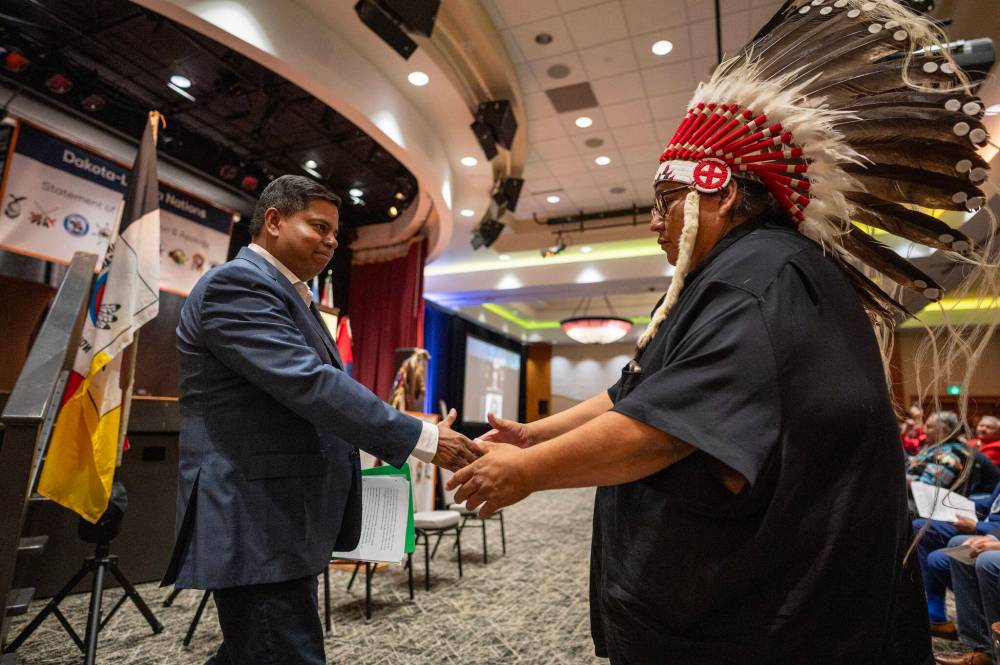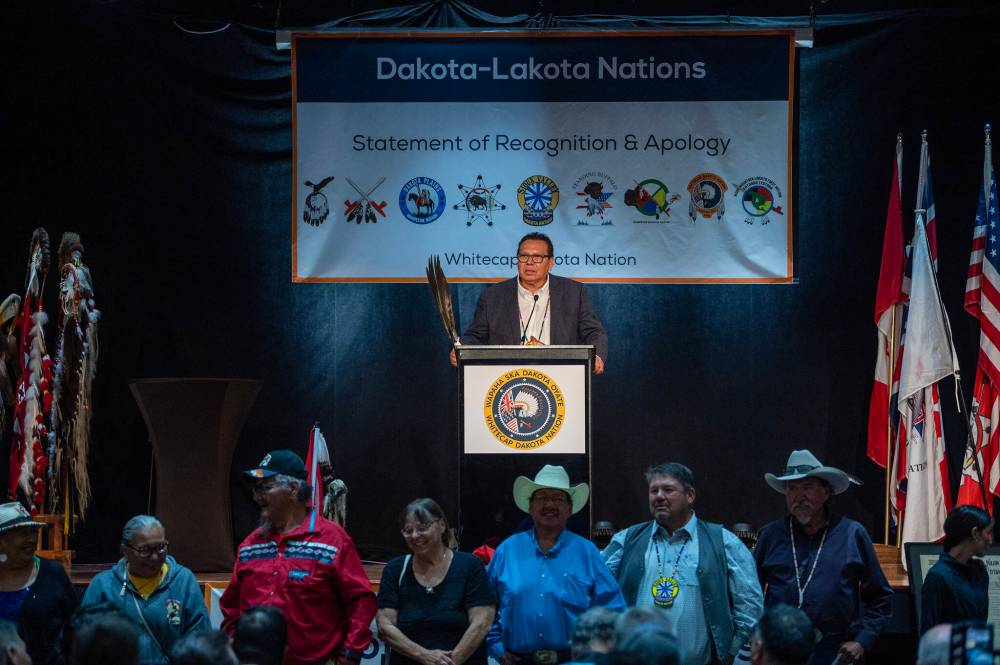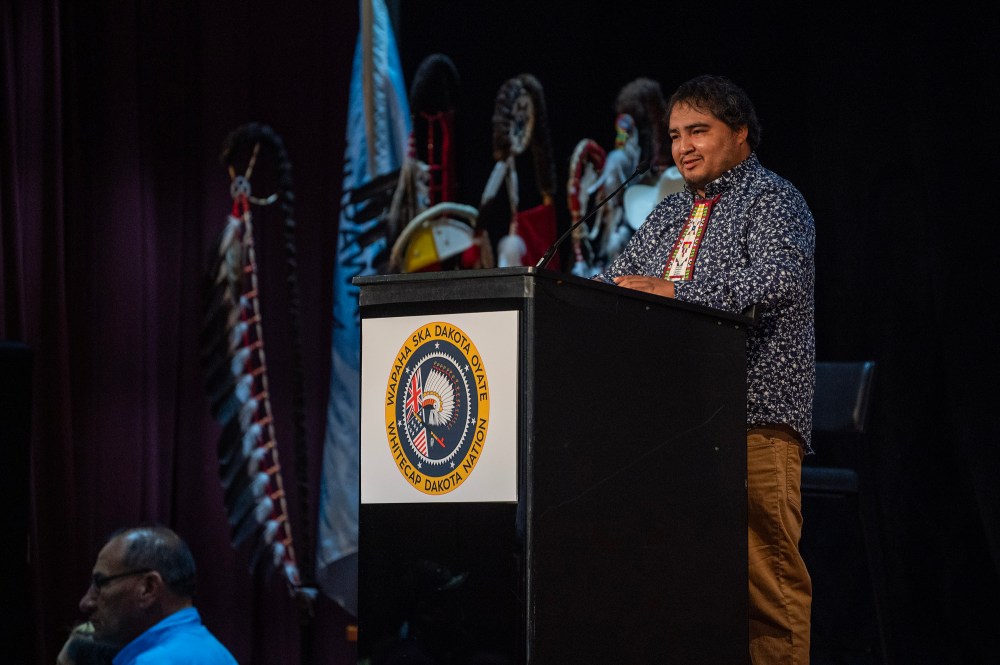Canada apologizes to 9 First Nations, admits it was wrong to label Dakota, Lakota as refugees
Advertisement
Read this article for free:
or
Already have an account? Log in here »
We need your support!
Local journalism needs your support!
As we navigate through unprecedented times, our journalists are working harder than ever to bring you the latest local updates to keep you safe and informed.
Now, more than ever, we need your support.
Starting at $15.99 plus taxes every four weeks you can access your Brandon Sun online and full access to all content as it appears on our website.
Subscribe Nowor call circulation directly at (204) 727-0527.
Your pledge helps to ensure we provide the news that matters most to your community!
To continue reading, please subscribe:
Add Brandon Sun access to your Winnipeg Free Press subscription for only
$1 for the first 4 weeks*
*$1 will be added to your next bill. After your 4 weeks access is complete your rate will increase by $4.99 a X percent off the regular rate.
Read unlimited articles for free today:
or
Already have an account? Log in here »
Hey there, time traveller!
This article was published 16/07/2024 (432 days ago), so information in it may no longer be current.
WHITECAP DAKOTA FIRST NATION, SASKATCHEWAN — Canada’s Crown-Indigenous relations minister has apologized to nine First Nations in Manitoba and Saskatchewan following decades of the Dakota and Lakota being labelled as refugees.
That list includes the Westman First Nations Sioux Valley Dakota Nation, Canupawakpa Dakota Nation and Birdtail Sioux First Nation as well as the Dakota Plains Wahpeton Nation and Dakota Tipi First Nation situated closer to Portage la Prairie.
Gary Anandasangaree said Monday at a ceremony at Whitecap Dakota First Nation south of Saskatoon that the groups should have been formally recognized as First Nations in Canada and subject to rights granted under Section 35 of the Canadian Constitution.

Gary Anandasangaree, minister of Crown-Indigenous relations (left), shakes hands with Canupawakpa Dakota Nation Chief Raymond Brown during a ceremony where the Canadian government delivered a formal apology to the nine Dakota and Lakota First Nations in Canada in Whitecap Dakota Nation, Sask., on Monday. (The Canadian Press)
“On behalf of the Government of Canada and all Canadians, we seek to begin to mend this injustice with three simple words: we are sorry,” he said.
“We acknowledge you have been treated as second-class First Nations, as strangers here on your homeland in Canada, a Canada you helped defend, build and develop.”
The apology was met with cheers from the crowd of more than 650 people.
The Dakota and Lakota, who have held land in Canada and the United States, have long had a strong presence in the country.
However, the Canadian government never recognized them as Aboriginal Peoples of Canada under the Constitution. Instead, they were viewed as strangers from the U.S. seeking refuge from the American military.
The Dakota and Lakota were defeated in battle by the Americans in the 1860s and 1870s, forcing many to move north. Canada allowed them to stay but ignored their title to land.
As a result, the Dakota and Lakota were not invited to sign treaties and received no treaty rights. They received smaller reserves and fewer economic supports than other Indigenous groups.
Anandasangaree said Canada’s failure to offer recognition hurt generations of Dakota and Lakota. He noted they had pledged their allegiance to the Crown during the War of 1812, when the U.S. declared war against Britain.
“You were allies, you were not refugees,” he said.
He added they were also subject to the residential school system, ’60s Scoop and other policies that have harmed Indigenous people.

Sioux Valley Dakota Nation Chief Vincent Tacan speaks during Monday's ceremony. (The Canadian Press)
“There’s no way to undo the years of collective trauma your people and nations endure to this day,” Anandasangaree said.
“Despite the racism, discrimination, social and economic exclusion and lingering harms of colonialism, your dignity as Indigenous people remains unbroken.”
He said Canada will work with the First Nations to develop treaties and agreements to affirm their rights in the Constitution.
Following Anandasangaree’s apology, representatives from the First Nations came to the podium to speak about what it meant to them and their communities. That included Sioux Valley Chief Vince Tacan, who said his people have never considered themselves refugees.
He also said that in 2009, before Sioux Valley achieved its self-governing status, the community’s elders worked to file a lawsuit in federal court over their designation as refugees.
“Many of those elders who kept the drive for recognition alive are no longer with us, but we thank them for their perseverance and know that they are with us in spirit and are proud of the achievement we celebrate today,” Tacan said.
“It’s taken 15 years, but today we’re fulfilling the first part of our claim for reconciliation by receiving this public apology, for which Sioux Valley Dakota Nation is grateful. We accept this apology with grace and we appreciate that these historical wrongs take time to acknowledge and also realize the cause of the harms takes even more time to heal from.”
In a release issued by the federal government, Birdtail Sioux Chief Lindsay Bunn said the apology recognizes the Dakota people as Indigenous to Canada.
“I believe this will allow our people to begin the process of reconciliation and healing in our relationship with Canada,” Bunn said. “Birdtail Sioux Dakota First Nation will commit to take its rightful place in the economic and political landscape of this country.”

His colleague from Canupawakpa, Chief Raymond Brown, said the apology was one that should have been given when his people first arrived in Dakota Country.
Whitecap Dakota First Nation signed a self-government agreement with Canada in 2023 that officially recognized its members as Aboriginal Peoples under the Constitution. It also recognized the Whitecap Dakota’s ability to make laws on-reserve.
Whitecap Dakota First Nation Chief Darcy Bear said the apology was a long time coming.
“We had territories on both sides of the border — and there was no border at the time — and we’ve been here since time immemorial,” he said.
“(Reserves) limited our opportunities but that’s all going to change, and that’s what we’re looking for, that acknowledgment.”
» The Canadian Press, with files from the Brandon Sun
